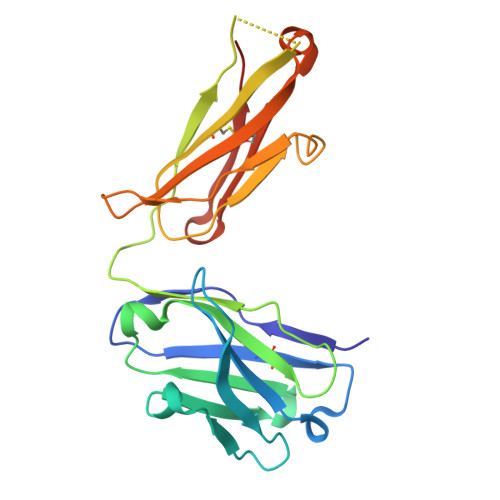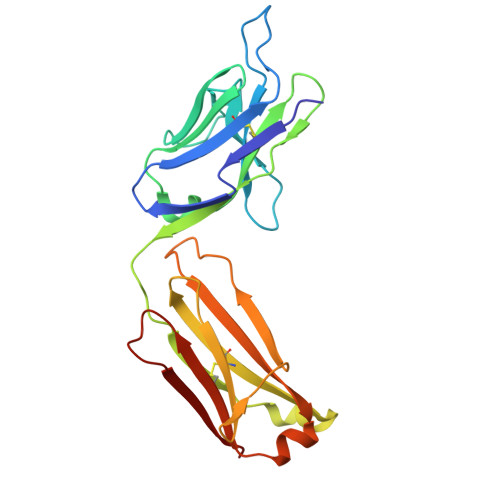pH-Responsive Polyethylene Glycol Engagers for Enhanced Brain Delivery of PEGylated Nanomedicine to Treat Glioblastoma.
Meng, J.L., Dong, Z.X., Chen, Y.R., Lin, M.H., Liu, Y.C., Roffler, S.R., Lin, W.W., Chang, C.Y., Tzou, S.C., Cheng, T.L., Huang, H.C., Li, Z.Q., Lin, Y.C., Su, Y.C.(2025) ACS Nano 19: 307-321
- PubMed: 39749925
- DOI: https://doi.org/10.1021/acsnano.4c05906
- Primary Citation of Related Structures:
8Z95 - PubMed Abstract:
The blood-brain barrier (BBB) remains a major obstacle for effective delivery of therapeutics to treat central nervous system (CNS) disorders. Although transferrin receptor (TfR)-mediated transcytosis is widely employed for brain drug delivery, the inefficient release of therapeutic payload hinders their efficacy from crossing the BBB. Here, we developed a pH-responsive anti-polyethylene glycol (PEG) ¡Á anti-TfR bispecific antibody (pH-PEG engager TfR ) that can complex with PEGylated nanomedicine at physiological pH to trigger TfR-mediated transcytosis in the brain microvascular endothelial cells, while rapidly dissociating from PEGylated nanomedicine at acidic endosomes for efficient release of PEGylated nanomedicine to cross the BBB. The pH-PEG engager TfR significantly increased the accumulation of PEGylated nanomedicine in the mouse brain compared to wild-type PEG engager TfR (WT-PEG engager TfR ). pH-PEG engager TfR -decorated PEGylated liposomal doxorubicin exhibited an enhanced antitumor effect and extended survival in a human glioblastoma (GBM) orthotopic xenograft mice model. Conditional release of PEGylated nanomedicine during BBB-related receptor-mediated transcytosis by pH-PEG engager TfR is promising for enhanced brain drug delivery to treat CNS disorders.
Organizational Affiliation:
Department of Biological Science and Technology, Center for Intelligent Drug Systems and Smart Bio-devices (IDS2B), National Yang Ming Chiao Tung University, Hsinchu 300, Taiwan.



















